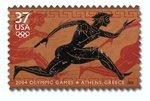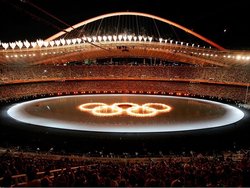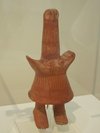2004 Summer Olympics
|
|
Template:Olympics infobox The Games of the XXVIII Olympiad, commonly known as the 2004 Summer Olympics were the 28th Summer Olympic Games. The Games were held in Athens over 17 days, from August 13 to August 29, 2004. Planners expected 10,500 athletes (in fact 11,099 competed) and 5,500 team officials from 202 countries. There were a total of 301 medal events from 28 different sports.
| Contents |
Medal table
Template:2004 Summer Olympics medal count
Bid and preparations
Aerial_view_of_Olympic_complex_in_Athens_2004_DSC06793.jpg
Ceremony4.jpg

Greece_2004_Olympics_flame_ceremony_DSC04251.jpg
Athens was chosen as the host city during the 106th IOC Session held in Lausanne in September 1997, after surprisingly losing the bid to organize the 1996 Summer Olympics. Athens bid on the games based largely on an appeal to Olympic history, since 1996 would be the 100th anniversary of the modern Olympic Games. In the last round of voting, Athens defeated Rome, Italy, 66 votes to 41. Cape Town, South Africa; Stockholm, Sweden; and Buenos Aires, Argentina, the three other cities that made the IOC shortlist, were eliminated in prior rounds of voting. Six other cities submitted applications, but their bids were dropped by the IOC in 1996. These cities were: Istanbul, Turkey; Lille, France; Rio de Janeiro, Brazil; San Juan, Puerto Rico, Seville, Spain; and Saint Petersburg, Russia.
NBC Universal paid the IOC $793 million for U.S. broadcast rights [1] (http://money.cnn.com/2004/08/30/news/fortune500/nbc_olympics/), the most paid by any country. It was the first Olympics since NBC had merged with Vivendi Universal Entertainment; the merger, along with the acquisitions of the Bravo and Telemundo networks, made it possible for the network to broadcast over 1200 hours of coverage during the games, triple what was broadcast in the U.S. four years earlier.
Following the September 11, 2001 attacks, concerns about terrorism were much higher. Greece increased the budget for security at the Olympics to €970 million (US$1.2 billion). Approximately 70,000 police officers patrolled Athens and the Olympic venues during the Olympics. NATO and the European Union also provided minor support, after Athens asked for co-operation.
When the International Olympic Committee expressed its concern over the progress of construction work of the new Olympic venues, a new Organizing Committee was formed under President Gianna Angelopoulos-Daskalaki. Athens was transformed into a city that uses state-of-the-art technology in transportation and urban development. Some of the most modern sporting venues in the world were built to host the 2004 Olympic Games.
Route_of_Olympic_Flame_Worldwide.gif
By late March 2004, some Olympic projects were still behind schedule, and Greek authorities announced that a roof would no longer be constructed over the main swimming venue. The main Olympic Stadium, the designated facility for the opening and closing ceremonies, was completed only two months before the games opened, with the sliding over of a futuristic glass roof designed by Spanish architect Santiago Calatrava . Other facilities, such as the streetcar line linking the airport, the stadium and the city, were largely unfinished just two months before the games. The subsequent pace of preparation, however, made the rush to finish the Athens venues one of the tightest in Olympics history. The Greeks, unperturbed, maintained that they would make it all along.
The lighting ceremony of the Olympic flame took place on March 25 in Ancient Olympia. For the first time ever, the flame travelled around the world in a relay to former Olympic cities and other large cities, before returning to Greece.
EMI released Unity, the official pop album of the Athens Olympics, in the leadup to the Olympics. It features contributions from Sting, Lenny Kravitz, Moby, Destiny's Child and Avril Lavigne. EMI has pledged to donate US$180,000 from the album to UNICEF's HIV/AIDS program in Sub-Saharan Africa. [2] (http://www.star-ecentral.com/music/sleeve/notes.asp?file=archives/sleeve/2004/5/26/26UnityOlymp&date=5/26/2004/2)
At least 19 people died during the work on the facilities. Most of these people were not from Greece.[3] (http://news.bbc.co.uk/1/hi/world/europe/3920919.stm)
Before the games, Greek hotel staff staged a series of one-day strikes over wage disputes. They have been asking for a significant raise for the period covering the event being staged. Paramedics and ambulance drivers have also been protesting, as they want the same Olympic bonuses promised to their security force counterparts.
In the event the 2004 games were described as 'unforgettable, dream Games' by the IOC president and the Greek government was congratulated for its organisation.[4] (http://news.bbc.co.uk/sport1/hi/olympics_2004/3609818.stm)
Mascots
Athens_athena_toy.jpg
Since the 1968 Winter Olympics in Grenoble, France it has been the tradition to have a mascot for the games; for 2004, the official mascots are sister and brother, Athiná and Phévos (pronounced in Greek, Athina and Fivos), named after the goddess of wisdom, strategy and war and Phoebos the god of light and music, respectively. They are inspired by the ancient daidala which were dolls that had religious links as well as being toys.
Online coverage
For the first time, major broadcasters were allowed to serve video coverage of the Olympics over the Internet, provided that they restricted this service geographically, to protect broadcasting contracts in other areas. For instance, the BBC made their complete live coverage available to UK high-speed Internet customers for free; customers in the U.S. were only able to receive delayed excerpts. [5] (http://www.iht.com/articles/533020.html)
The International Olympic Committee forbade Olympic athletes, as well as coaches, support personnel and other officials, from setting up specialized weblogs and/or other websites for covering their personal perspective of the games. They were not allowed to post audio, video, or photos that they had taken. An exception was made if an athlete already has a personal website that was not set up specifically for the Games. [6] (http://www.wired.com/news/print/0,1294,64650,00.html)
Opening ceremony
- Main article: 2004 Summer Olympics opening ceremony

Opening_Ceremony_Athens_2004_Goddess.jpg
The Opening Ceremony held on August 13, 2004 began with a thirty second countdown paced by the sounds of an amplified heartbeat. As the countdown was completed, fireworks rumbled and illuminated the skies overhead as fire erupted from a reflecting pool in the middle of the stadium creating a burning image of the Olympic rings. The Opening Ceremony was a pageant of traditional Greek culture and history hearkening back to its mythological beginnings. The program began as a young Greek boy sailed into the stadium on a ship waving the host nation's flag and then various characters from ancient Greek myths appeared, followed by a float parade chronicling Greek history from the ancient Minoan civilization to modern times.
Olympic_flame_at_opening_ceremony.jpg
The Opening Ceremony culminated in the lighting of the Olympic Cauldron by 1996 Gold Medalist Windsurfer Nikolaos Kaklamanakis. The gigantic cauldron, which was styled after the Athens 2004 Olympic Torch, pivoted down to be lit by the 35 year-old, before slowly swinging up and lifting the flame high above the stadium. Following this, the stadium found itself at the centre of a rousing fireworks spectacular.
Closing ceremony
The Games were concluded on August 29, 2004. The closing ceremony was held at the Athens Olympic Stadium, where the Games had been opened 16 days earlier. Around 70,000 people gathered in the stadium to watch the ceremony.
The ceremony ended with a variety of musical performances by Greek singers, including Anna Vissi, Sakis Rouvas, Eleftheria Arvanitaki, Alkistis Protopsalti, Marinella, George Dalaras, Dimitra Galani, and Haris Alexiou, as thousands of athletes carried out humorous and symbolic displays on the stadium floor. Before that, the Twelve Girls Band from China sang Mo Li Hua (Jasmine Flower) and the medal ceremony for the last event of the Olympiad, the Men's Marathon, was conducted, with Stefano Baldini from Italy as the winner.
A flag-bearer from each nation's delegation then entered along the stage, followed by the competitors en masse on the floor.
After short speeches by Gianna Angelopoulos-Daskalaki, chief Greek organizer of the Games, and by President Dr. Jacques Rogge of the IOC, in which he describes the Athens Olympics as "unforgettable, dream Games", the national anthems of Greece and China were played in a handover ceremony as both nations' flags were raised. The Mayor of Athens, Dora Bakoyianni, passed the Olympic Flag to the Mayor of Beijing, Wang Qishan. After a short cultural performance by Chinese actors, dancers, and musicians directed by eminent Chinese director Zhang Yimou, Rogge declared the 2004 Olympic Games closed.
A young Greek girl, Fotini Papaleonidopoulou, lit a symbolic lantern with the Olympic Flame and passed it on to other children before "extinguishing" the flame in the cauldron by blowing a puff of air.
Sports
The official event categories are listed below. For the first time, the Wrestling category featured women's wrestling and in the Fencing competition women competed in the sabre. American Kristin Heaston, who led off the qualifying round of women's shotput became the first woman to compete at the ancient site of Olympia but Cuban Yumileidi Cumba became the first woman to win a gold medal there.
The demonstration sport of Wheelchair Racing marked a joint Olympics/Paralympics event, allowing a Paralympics event to occur within the Olympics, and for the future, opening up Wheelchair racing to the able-bodied. The 2004 Summer Paralympics were also held in Athens, from September 17 to 28.
Articles about Athens Summer Olympics by sport:
See also: Category:Competitors at the 2004 Summer Olympics
Nations
Articles about Athens Summer Olympics by nation:
Articles about Athens Summer Olympics by country grouping:
Venues
Competition venues
Football (soccer) venues
- Kaftanzoglio Stadium, Thessaloniki
- Karaiskaki Stadium, Athens
- Pampeloponnisiako Stadium, Patra
- Pankritiko Stadium, Heraklion
- Panthessaliko Stadium, Volos
Non-competition venues
- Eleftherios Venizelos Athens International Airport
- International Broadcast Centre IBC
- Main Press Centre
- Olympic Village
See also
- 2004 Olympic Torch Relay
- International Olympic Committee
- IOC country codes
- 2004 Summer Paralympics
- Scandals of the 2004 Summer Olympics
- World records at the 2004 Summer Olympics
- Olympic records at the 2004 Summer Olympics
External links
- Athens 2004 website (http://www.athens2004.com/en/)
- IOC page on Athens (http://www.olympic.org/uk/games/athens/index_uk.asp)
- Costs of hosting the 2004 Olympics (http://mutualfunds.about.com/od/news/a/2004_olymics.htm)
- Medal picks (http://sports.yahoo.com/oly/news;_ylc=X3oDMTBpa2NlMmlrBF9TAzk2NjUxNzI1BHNlYwN0bQ--?slug=ap-medalpicks&prov=ap&type=lgns) by Associated Press beat writers
- Media coverage:LookSmart category (http://search.looksmart.com/p/browse/us1/us317902/us554370/us64028/us282844/us575637/us10125632), BBC (http://news.bbc.co.uk/sport1/hi/olympics_2004/default.stm), CBC (http://www.cbc.ca/olympics) NBC (http://www.nbcolympics.com/), and Seven Network (http://www.sevensport.com.au/)
- Medal count analyses: Medal count by population (http://simon.forsyth.net/olympics.html) and Relative Performance Index (http://edit.mougayar.com/athens2004)
| Olympic Games |
| Summer Olympic Games |
| 1896 | 1900 | 1904 | 1906¹ | 1908 | 1912 | (1916)² | 1920 | 1924 | 1928 | 1932 | 1936 | (1940)² | (1944)² | 1948 | 1952 | 1956 | 1960 | 1964 | 1968 | 1972 | 1976 | 1980 | 1984 | 1988 | 1992 | 1996 | 2000 | 2004 | 2008 | 2012 | 2016 | 2020 |
| Winter Olympic Games |
| 1924 | 1928 | 1932 | 1936 | (1940)² | (1944)² | 1948 | 1952 | 1956 | 1960 | 1964 | 1968 | 1972 | 1976 | 1980 | 1984 | 1988 | 1992 | 1994 | 1998 | 2002 | 2006 | 2010 | 2014 | 2018 |
|
de:Olympische Sommerspiele 2004 et:2004. aasta suveolümpiamängud el:Θερινοί Ολυμπιακοί Αγώνες 2004 es:Juegos Olímpicos de Atenas 2004 eo:Someraj Olimpikoj 2004 fr:Jeux Olympiques d'été de 2004 id:Olimpiade Athena 2004 it:XXVIII Olimpiade he:אולימפיאדת אתונה (2004) hu:2004. évi nyári olimpiai játékok nl:Olympische Zomerspelen 2004 ja:アテネオリンピック (2004年) no:Sommer-OL 2004 pl:Letnie Igrzyska Olimpijskie 2004 pt:Jogos Olímpicos de Verão de 2004 ro:Jocurile Olimpice din 2004 sl:Olimpijske igre Atene 2004 fi:2004 kesäolympialaiset sv:Olympiska sommarspelen 2004 zh:2004年夏季奥林匹克运动会

